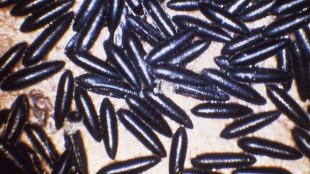 Aedes aegypti eggsWIKIMEDIA, CDCThe fast spread of Zika, which is now impacting nearly 50 countries on three continents, in combination with our limited understanding of the virus and infection-related symptoms and how the ongoing outbreak in Brazil might affect the upcoming Olympic Games in Rio, has garnered significant attention for this emerging pathogen. However, this recent attention on the Zika virus could wane quickly, particularly after the completion of the Olympic Games—which will justifiably not be cancelled or postponed due to the outbreak—and as a result of more positive news on the diagnostics and vaccine development fronts. Therefore, the public’s concerns regarding the Zika virus—including the corresponding pressure on politicians to provide reasonable funding to fight its spread—should be utilized to develop broader and more encompassing strategies to combat mosquito-borne diseases in general.
Aedes aegypti eggsWIKIMEDIA, CDCThe fast spread of Zika, which is now impacting nearly 50 countries on three continents, in combination with our limited understanding of the virus and infection-related symptoms and how the ongoing outbreak in Brazil might affect the upcoming Olympic Games in Rio, has garnered significant attention for this emerging pathogen. However, this recent attention on the Zika virus could wane quickly, particularly after the completion of the Olympic Games—which will justifiably not be cancelled or postponed due to the outbreak—and as a result of more positive news on the diagnostics and vaccine development fronts. Therefore, the public’s concerns regarding the Zika virus—including the corresponding pressure on politicians to provide reasonable funding to fight its spread—should be utilized to develop broader and more encompassing strategies to combat mosquito-borne diseases in general.
Although the Zika virus can have severe consequences for the affected individuals, the global impact of the Zika virus pales in comparison to that of other mosquito-borne diseases. With more than half a million deaths each year, mosquito-borne diseases such as malaria, dengue, and yellow fever still represent one of the 10 most common causes of morbidity and mortality in low-income countries, highlighting the need for a broad strategy incorporating the variety of mosquito-borne diseases as well as regional and local circumstances.
In particular, the focus on a Zika vaccine—although important—could result in a misplaced illusion of protection, thereby removing the required attention and future financial backing to combat mosquito-borne diseases.
The economic framework for the development, production, storage, and application of vaccines targeting mosquito-borne ...




















